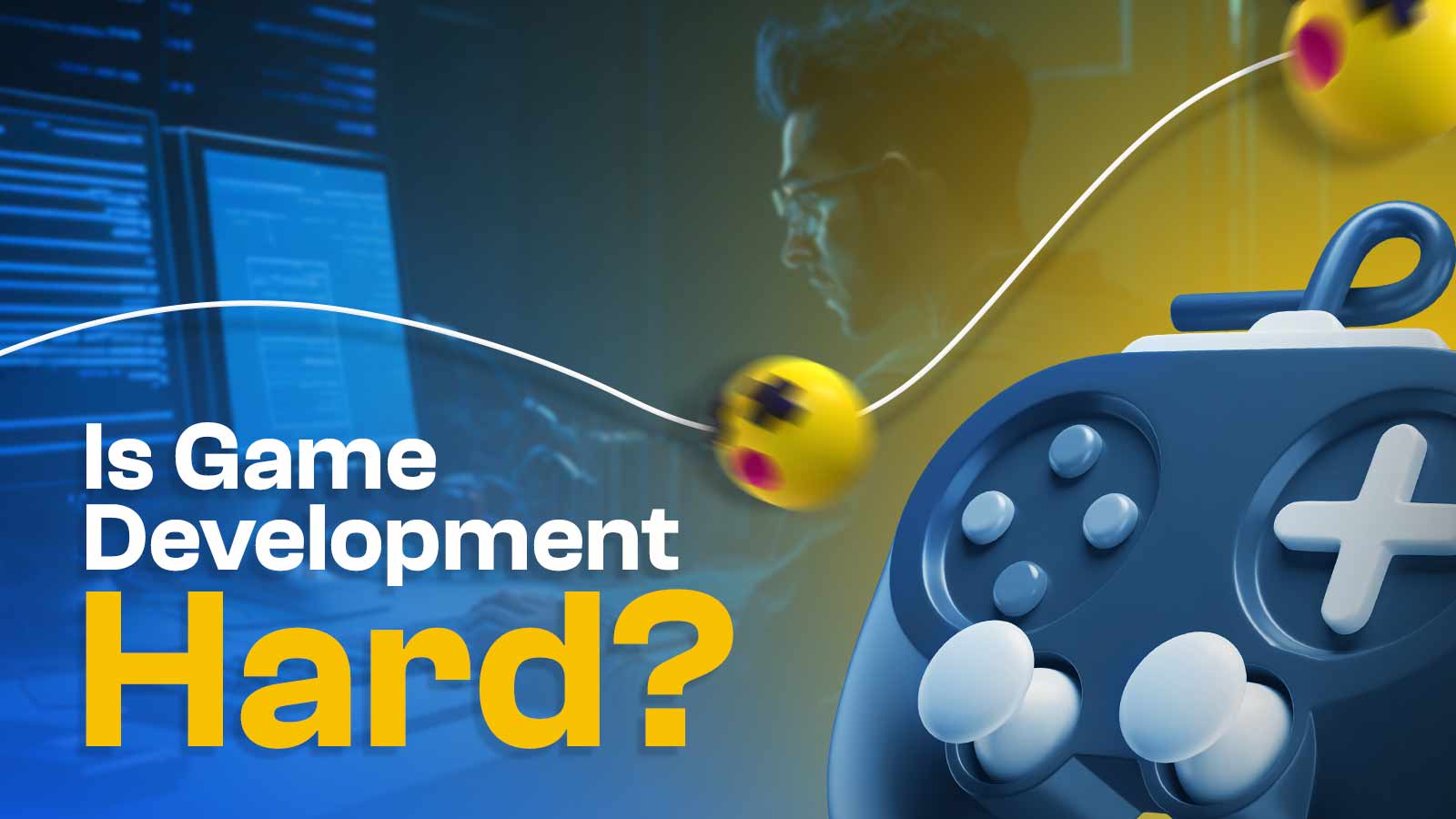
Cracking The Challenge: Is Game Development Hard?
Undertaking the journey of game development sparks curiosity about its inherent challenges. Many aspiring developers wonder, “Is game development hard?”
Game development can be challenging due to its multifaceted nature, involving coding, design, and collaboration. The complexity arises from the need to create immersive and engaging experiences. While it demands dedication and continuous learning, the rewards lie in crafting interactive worlds and staying at the forefront of technological innovation.
This blog post aims to unravel the complexities and shed light on the multifaceted nature of game development.
What Is Game Development?

Game development is creating video games, encompassing design, programming, art, and testing. It begins with concept ideation and game design, followed by coding to implement mechanics and functionality. Artists contribute graphics and animations, while sound designers create audio elements.
Game developers use various platforms and programming languages like Unity, Unreal Engine, and C++ or C#. Iterative testing and debugging refine the game’s performance and user experience. The final product, a cohesive interactive experience, can range from simple mobile games to complex, immersive AAA titles for consoles and PCs, providing entertainment and engagement for players.
Is Game Development Hard?

Game development can be challenging due to its unique set of problems. Game developers must navigate technical complexities, including coding, graphics, and sound design. The industry’s dynamic nature demands constant adaptation to emerging technologies and player expectations. Creativity is crucial for designing engaging gameplay and compelling narratives.
Developers often face tight deadlines, requiring efficient project management skills. The iterative nature of game design demands flexibility and a willingness to revisit and refine ideas. The dedication required is immense, as long working hours and tight schedules are standard. Collaboration is essential, with interdisciplinary teams coordinating efforts. Despite its challenges, the passion for creating interactive and immersive experiences drives many to overcome these obstacles, making game development a rewarding but demanding endeavor.
Why Is Game Development Hard?

Game development is a challenging endeavor, and there are several reasons why it’s considered a high bar to entry for aspiring designers and developers. Here are seven key reasons:
Time-Consuming Nature:
Developing a video game is a time-consuming process. The sheer scope of imagination and creativity in game design means that even a small component can take significant time to create and refine. This time investment can lead to a draining work schedule, dominating the days and leaving little time for other activities. Balancing work and personal life becomes challenging for those deeply involved in game development.
Energy-Draining Work:
The intense focus and dedication required in game development can be energy-draining. As a programmer or designer, the constant refinement and improvement of the game demand sustained effort. This level of commitment may make individuals less available to spend time with loved ones or engage in other personal activities, making it a mentally and physically demanding profession.
Lack of Accessible Education:
One significant barrier to entry is the lack of accessible, high-quality educational programs in game development. Many aspiring developers need help finding comprehensive courses or degrees that provide the necessary skills. While success is possible without a traditional bachelor’s degree in computer science or programming, the absence of widely available educational resources can make it difficult for individuals to acquire the essential knowledge and skills needed for a career in game development.
Communication Challenges:
Effective communication is crucial in game development, especially in interdisciplinary teams where individuals from various backgrounds collaborate. Language barriers can hinder the exchange of ideas and the efficient resolution of problems. Language proficiency becomes vital since much of the game design literature is written in English. For individuals whose first language is not English, improving language abilities becomes a necessary step to overcome this obstacle.
Global Collaboration:
Game development often involves collaboration on a global scale, with team members located in different parts of the world. Coordinating efforts and addressing challenges across different time zones and cultural contexts can be complex. Overcoming these challenges requires adaptability, flexibility, and a commitment to fostering effective communication within diverse teams.
High Standards for Polish:
The gaming industry sets high standards for the polish and quality of games. Achieving a polished and refined final product requires meticulous attention to detail, rigorous testing, and continuous iteration. Developers must be committed to refining their work until it meets the highest standards. This pursuit of excellence adds a layer of difficulty to the development process.
Personality Traits Necessary:
Success in game development requires specific personality traits, including creativity, adaptability, and dedication. Developers need to be creative in designing engaging gameplay and compelling narratives. Adaptability is essential to navigating the dynamic and ever-changing landscape of the gaming industry. Dedication is crucial to overcoming the challenges and setbacks inherent in the development process.
Hard Skills Needed To Be A Game Developer

Becoming a successful game developer requires a combination of technical proficiency, creativity, and problem-solving abilities. Here are six key hard skills essential for aspiring game developers:
Programming Languages:
Proficiency in programming languages is fundamental to game development. C++ is widely used in the industry, particularly for developing game engines. Other languages, such as C# and Python, are also valuable depending on the game development platform. Understanding data structures, algorithms, and object-oriented programming principles is crucial for efficient and optimized code, facilitating smooth gameplay and overall performance.
Game Engines:
Game engines are the foundation for game development, providing essential tools and frameworks. Familiarity with popular game engines like Unity or Unreal Engine is vital. Unity, for instance, is widely used for its versatility, supporting both 2D and 3D game development. Unreal Engine is renowned for its high-end graphics capabilities. Proficient use of these engines enables developers to streamline the creation of game mechanics, graphics, and overall functionality.
Mathematics and Physics:
A solid understanding of mathematics and physics is essential for game developers. These skills are applied in various aspects of game development, including character movement, collision detection, and realistic physics simulations. Trigonometry, linear algebra, and calculus are particularly relevant. Game developers use mathematical concepts to create lifelike animations, realistic physics simulations, and ensure precise spatial relationships within the game environment.
Graphics and Animation:
Game developers need expertise in graphics and animation to create visually appealing and immersive gaming experiences. Knowledge of graphics programming, including rendering techniques and shaders, is crucial. Artists and animators use software like Blender or Autodesk Maya to design characters, environments, and animations. Understanding the integration of these assets into the game engine ensures that the visual elements align seamlessly with the overall design.
Networking and Multiplayer Integration:
For games with online multiplayer features, knowledge of networking is indispensable. Developers must understand how to implement network functionality, handle data synchronization, and manage multiplayer interactions. Proficiency in latency, lag compensation, and server-client architecture is crucial for creating a smooth and responsive multiplayer gaming experience.
Artificial Intelligence (AI):
Game developers often incorporate AI to create dynamic and challenging gameplay. Understanding AI algorithms, pathfinding, decision trees, and behavior scripting is essential. AI enhances non-player character (NPC) behavior, enemy interactions, and game complexity. Game developers use AI to create engaging and responsive game worlds where characters and entities can adapt to player actions and environmental changes.
Soft Skills Needed To Be A Game Developer

While hard skills are crucial for the technical aspects of game development, soft skills play an equally vital role in ensuring success in this dynamic and collaborative field. Here are five essential soft skills for aspiring game developers:
Creativity:
Creativity is the heartbeat of game development. Game developers must think outside the box, envision unique game concepts, and design compelling narratives. Whether creating innovative gameplay mechanics or designing visually stunning worlds, the ability to generate original and imaginative ideas is fundamental. Creative thinking allows developers to solve complex design challenges, making games more engaging and memorable for players.
Collaboration and Communication:
Game development is rarely a solitary endeavor; it involves collaboration with diverse teams comprising artists, designers, and programmers. Strong communication skills are essential to convey ideas effectively, understand team members’ perspectives, and ensure a cohesive vision for the game. Collaborative environments thrive on open communication, where developers can share feedback, discuss solutions, and collaborate seamlessly to bring a game to fruition.
Adaptability:
The gaming industry is dynamic, with technology, platforms, and player expectations constantly evolving. Game developers must adapt quickly to changes, whether it’s learning a new programming language, integrating emerging technologies, or adjusting to shifts in project scope. The ability to embrace change and navigate uncertainties is crucial for staying relevant and competitive in the ever-changing game development landscape.
Problem-Solving:
Game development is inherently problem-solving-oriented. Developers encounter challenges related to programming, design, and overall project implementation. Strong problem-solving skills enable developers to analyze issues systematically, identify root causes, and implement effective solutions. Whether debugging code, optimizing performance, or addressing design flaws, approaching problems methodically is essential for overcoming obstacles in the development process.
Time Management:
Game development projects often operate under tight schedules and deadlines. Effective time management is crucial for meeting milestones, delivering projects on time, and ensuring the overall success of a game. Developers must prioritize tasks, set realistic goals, and allocate time efficiently across different aspects of the development process. Balancing creativity with the discipline of meeting deadlines is a key skill that contributes to the overall efficiency of the development team.
Is An Educational Degree Essential For Game Development?
While a formal educational degree is optional for a career in game development, it can significantly enhance one’s prospects. Successful game developers have entered the industry through self-learning, online courses, or alternative paths. Practical skills, demonstrated through a portfolio of projects, often carry considerable weight.
However, specific roles, especially those in larger game development studios or specialized fields like graphics programming, may prefer or require a relevant degree in computer science, game development, or a related field. Ultimately, a combination of practical skills, a strong portfolio, and a deep understanding of the industry can open doors to a successful career in game development, with or without a traditional educational degree.
Competitive Nature & Trends Of Game Development

The game development industry is fiercely competitive, with aspiring creators worldwide vying for the attention of gaming firms. It’s not just about having an intriguing vision or a five-year strategy; demonstrating the ability to deliver is equally crucial. Building a portfolio of games, even if created independently, provides a tangible advantage in showcasing practical skills and past accomplishments.
Continuous innovation is key in this dynamic field. Whether refining existing game concepts or introducing new ideas, staying creative is essential. Fresh ideas set you apart and position you to respond to unexpected opportunities, gaining a competitive edge.
Current trends in game development reflect the industry’s evolution. Mobile gaming has become a prominent avenue with its demand for quick, engaging gameplay ideas. The casual market, in particular, attracts developers who can swiftly generate captivating gaming experiences. Meanwhile, in the console and older PC gaming, there’s a notable shift away from cloning popular brands, with a growing emphasis on original or reimagined intellectual property.
Gamification, integrating game elements into non-gaming contexts, is gaining momentum in various industries. This trend is poised to reshape aspects of our daily lives, presenting new opportunities and challenges for game developers.
The industry accommodates a diverse range of designers, each with unique styles and specializations. Finding a dream job involves understanding one’s strengths and preferences. Whether you thrive in mobile gaming, contribute to the console and PC market’s evolution, or explore innovative applications through gamification, there are opportunities for every kind of game designer.
Adaptability, creativity, and a keen awareness of industry trends are essential in this competitive landscape. Keeping pace with the ever-changing nature of game development ensures that aspiring creators are competitive and well-positioned to contribute to the exciting and evolving gaming world.
Why Should You Learn Game Development?

Learning game development offers many benefits, from personal growth to professional opportunities. Here are six compelling reasons why you should consider delving into the world of game development:
Enhanced Problem-Solving Abilities:
Game development challenges individuals to think critically and solve complex problems. Designing various player scenarios and overcoming obstacles within the game requires strong problem-solving skills.
As you delve into programming languages like Python, C++, and JavaScript, you acquire technical proficiency and develop the ability to analyze challenges, devise solutions, and optimize performance. The intersection of mathematics, code, and physics in game development further refines your problem-solving capabilities.
Become a Better Designer:
Game development is a unique blend of coding and visual design. Learning to code is just one aspect; you also delve into creating the game’s visual style. This dual focus on innovation and programming prepares you for real-world applications where technical and creative skills are valued.
Developing visually appealing games with engaging gameplay enhances your creative abilities and expands your imaginative capacity. The importance of good visuals and entertaining gameplay is underscored in the success of fun, making game development a platform to hone design skills.
Profitable Opportunities:
Proficiency in game development opens doors to various profitable opportunities. You can create and sell your games on platforms like the Google Play Store, monetizing your skills directly. Alternatively, you can offer your game development services to others, charging fees for your expertise.
Employment opportunities with gaming companies also present a lucrative path. Whether through selling games, freelance work, or salaried positions, game developers have the potential to generate income and even establish their ventures.
Foster Collaborative Abilities:
Game development is a collaborative endeavor requiring diverse skills, including design, graphics, and audio. Working in a team setting is essential for smooth game development and optimal performance. Collaboration enhances the final product and exposes individuals to diverse perspectives and approaches.
Learning to work effectively within a team is a valuable skill applicable across various industries and is crucial in achieving success in the competitive field of game development.
Learning on Your Own:
Game development is a field that allows for self-directed learning. You can turn your ideas into games independently, showcasing your creativity and problem-solving skills. Creating an interactive résumé through game projects provides a unique and personalized way to stand out to potential employers.
The ability to learn independently is a valuable trait, and game development offers a flexible learning path that individuals can pursue at their own pace.
Current Trends and Industry Relevance:
Game development is at the forefront of technological trends and innovation. Staying abreast of industry developments ensures your skills remain relevant and in demand. As the industry evolves, learning game development keeps you engaged with emerging technologies, such as virtual and augmented reality, positioning you at the cutting edge of the digital entertainment landscape.
How to Start Learning Game Development?

Here’s a step-by-step guide to help you kickstart your game development learning journey:
1. Learn Computer Programming:
The foundation of game development lies in computer programming. Familiarize yourself with fundamental programming languages such as C++, C#, Python, or Java. If you’re a beginner, resources like Harvard University’s Introduction to Computer Science can provide a solid starting point. While no specific language is exclusive to game development, C++ is widely used for its efficiency and popularity in gaming engines.
2. Start with a Known Game Engine:
Game engines simplify the game development process by providing tools for graphics rendering, animation, AI, and more. Begin with a popular game engine like Unity, known for its user-friendly interface and a free personal version. Unreal Engine is another prominent choice offering customization options. Sticking with one game engine and mastering it is crucial for future projects.
While using a game engine is optional, it significantly streamlines the development process. Not using one entails more technical work but provides valuable learning opportunities.
3. Create a Basic Game:
Apply your newfound knowledge by creating a simple game. Begin with a project that aligns with your current skill level, focusing on understanding the fundamental principles rather than creating a masterpiece overnight. Tetris is a popular starting point, teaching essential game loop steps and core game development concepts. Ensure your chosen game has a clear goal and endpoint.
4. Understand Game Design Patterns:
Game design patterns are templates for modular code that address recurring challenges in game development. In small games, learn and implement patterns like Object Pooling, Flyweight, Prototype, and Observer. Familiarizing yourself with these patterns and their applications will enhance your problem-solving skills in future game development endeavors.
Recommended Resource: “Game Programming Patterns” by Robert Nystrom.
5. Learn 3D Graphics and Math:
As games increasingly demand realistic visuals, understanding 3D graphics and math becomes crucial. Delve into linear algebra concepts, including matrices, vectors, and linear equations, as they form the basis of 3D graphics. Resources like “3D Math Primer for Graphics and Game Development” and MIT OpenCourseWare’s Linear Algebra Basics on YouTube can provide valuable insights.
Online Resources to Learn Game Development

Unity Learn:
Unity, one of the most popular game engines, provides a dedicated learning platform called Unity Learn. It offers a range of tutorials, courses, and projects covering various aspects of game development. Unity Learn accommodates learners with diverse skill sets from beginner to advanced levels.
Coursera: Game Development Specializations:
Coursera hosts specialized courses in game development offered by renowned institutions like the University of Michigan. These comprehensive specializations cover game design, development, and programming, providing a structured learning path.
Udemy: Complete Game Development Courses:
Udemy features various game development courses, from beginner-friendly introductions to advanced topics. Classes often include hands-on projects, allowing learners to apply theoretical concepts in practical scenarios.
Gamasutra: Game Development Articles and Resources:
Gamasutra is a valuable resource for game developers, offering articles, insights, and postmortems from industry professionals. Stay updated with industry trends, best practices, and in-depth analyses to broaden your knowledge.
Brackeys YouTube Channel:
Brackeys, a popular YouTube channel, provides engaging and informative game development tutorials. Covering Unity and other relevant tools, Brackeys’ videos cater to various skill levels and offer practical guidance on implementing specific game features.
GitHub: Open Source Game Projects:
GitHub hosts numerous open-source game projects that provide hands-on learning opportunities. Exploring the source code of existing games allows you to understand real-world implementations and coding practices experienced developers use.
GameDev.net: Game Development Community:
GameDev.net is a vibrant community where game developers can connect, share experiences, and seek advice. The platform’s forums, articles, and resources offer valuable insights into industry trends and challenges.
FAQs
Is Learning Game Development Time-Consuming?
Game development can be time-consuming due to the complexity of designing and programming interactive experiences. However, the time invested is proportional to the depth of knowledge and skills acquired, making it worthwhile.
Do I Need A Formal Education In Game Development?
While a formal education can be beneficial, it’s optional. Many successful developers have entered the industry through self-learning and practical experience. Building a solid portfolio of projects often holds equal or greater weight than a traditional degree.
What Skills Are Crucial For Game Development?
Essential skills include proficiency in programming languages (such as C++ or UnityScript), knowledge of game engines, creativity in design, problem-solving abilities, and effective communication for collaborative efforts.
How Competitive Is The Game Development Industry?
The game development industry is highly competitive, with individuals worldwide vying for attention from gaming firms. Building a robust portfolio, demonstrating the ability to deliver, and staying updated with industry trends are crucial for standing out.
Is Game Development Only About Coding?
No, game development encompasses a range of skills beyond coding. Designing visuals, creating engaging gameplay, and understanding player preferences are integral components. Game designers require a blend of technical and creative abilities to succeed.
Can I Learn Game Development On My Own?
Yes, game development is a field that allows for self-directed learning. With the plethora of online resources, tutorials, and communities, individuals can acquire the necessary skills independently, turning ideas into games.
Is Game Development Financially Rewarding?
Proficiency in game development can lead to various profitable opportunities. Developers can sell their games on platforms, offer freelance services, or secure employment with gaming companies. The potential for financial gain exists through multiple avenues within the industry.
Finally, How Comparable Is Coding To Game Development?
Coding and game development share a symbiotic relationship but differ in scope and emphasis. While coding is fundamental to game development, a game designer’s role extends beyond traditional programming. Game designers possess a unique blend of technical and creative skills, with an innate ability to understand player preferences and envision the broader context of their games.
Game development incorporates coding as a crucial tool, but it also encompasses a multifaceted and expressive design process where designers leverage their intuitive understanding of player dynamics to craft immersive and engaging experiences. In essence, coding is a component of game development, but the latter involves a broader, more expressive skill set.

















































